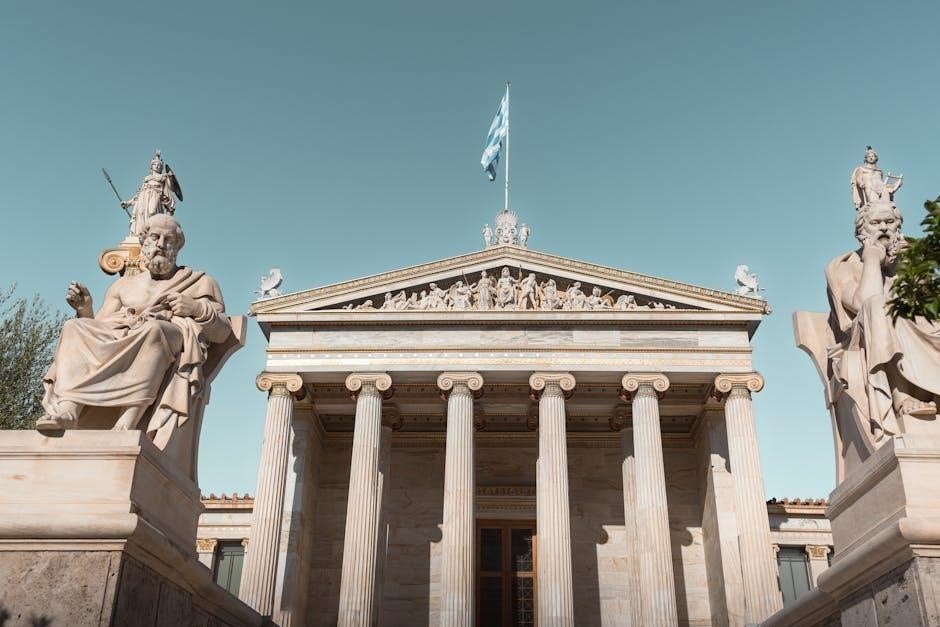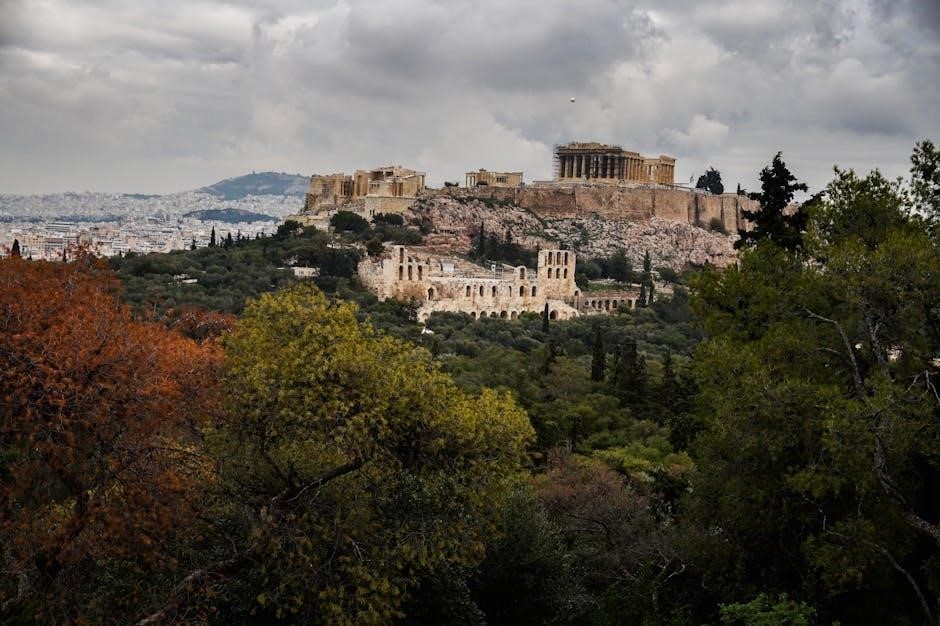Plato’s Gorgias is a seminal dialogue exploring rhetoric, justice, and philosophy. It critiques sophistry, emphasizing truth over persuasion, and remains influential in Western philosophical thought.
Background and Context
Plato’s Gorgias was likely written in the 380s BCE, during a period of philosophical and political turmoil in Athens. The dialogue is set in the house of Callicles, where Socrates engages with the renowned rhetorician Gorgias and his followers, Polus and Callicles. This setting reflects the intellectual climate of Athens, where rhetoric was highly valued as a tool for political influence. The dialogue critiques the sophistic tradition, which emphasized persuasive speech over ethical truth. By exploring the tensions between rhetoric and philosophy, Plato lays the groundwork for his broader critique of Athenian democracy and the ethical failures of sophism. This context underscores the dialogue’s relevance to understanding Plato’s views on education, justice, and the ideal society.
Significance of the Dialogue
Plato’s Gorgias holds profound significance as it confronts the ethical implications of rhetoric and its misuse in society. By pitting Socratic philosophy against sophistry, the dialogue underscores the importance of seeking truth over mere persuasion. It challenges the notion that power and eloquence alone justify moral authority, advocating instead for a life guided by virtue and justice. This critique remains relevant today, offering insights into the ethical dimensions of communication and leadership. The dialogue’s exploration of these themes has made it a cornerstone of Western philosophical thought, influencing debates on education, politics, and the role of rhetoric in shaping public discourse.
Structure and Key Interlocutors
Plato’s Gorgias is structured as a dramatic dialogue, featuring Socrates, Gorgias, Polus, Callicles, and Chaerephon. The conversation unfolds in Callicles’ house, with Socrates engaging in debates that progress from polite discourse to intense argumentation. Gorgias, a renowned rhetorician, initially defends his craft but struggles under Socratic scrutiny. Polus, his pupil, takes over, asserting rhetoric’s power but failing to define its moral basis. Callicles, the final interlocutor, advocates for a ruthless pursuit of power, clashing sharply with Socratic ideals. Through these interactions, Plato highlights the tensions between rhetoric, morality, and philosophy, using each figure to represent distinct facets of sophistry and its ethical implications.

Key Themes in Gorgias
Central themes include rhetoric’s role in society, the nature of justice, persuasion’s ethical implications, and the pursuit of virtue, highlighting tensions between morality and power.
Rhetoric vs. Philosophy
In Gorgias, Plato explores the tension between rhetoric and philosophy, with Socrates critiquing rhetoric as mere persuasion without regard for truth. He argues that rhetoric, as practiced by sophists, prioritizes winning arguments over seeking wisdom, often relying on flattery rather than reason. Philosophy, in contrast, seeks truth and justice, emphasizing the importance of ethical discourse. Socrates challenges Gorgias and other interlocutors to distinguish between genuine persuasion, which aims at the good, and manipulative rhetoric, which serves self-interest. This debate underscores Plato’s belief that philosophy, not rhetoric, is the true art of persuasion, as it aligns with virtue and the pursuit of knowledge.
The Nature of Justice
In Gorgias, Plato examines justice through Socratic dialogue, challenging the relativistic views of his interlocutors. Gorgias and Polus argue that justice varies by context, often aligning with power, while Callicles asserts that might makes right. Socrates counters by defining justice as a universal moral principle, emphasizing the harmony of the soul and the common good. He argues that true justice is not about personal gain or dominance but about living virtuously and promoting equality. This debate highlights Plato’s belief in an objective standard of justice, rooted in reason and ethics, rather than fleeting human conventions or power dynamics.
The Role of Persuasion
In Gorgias, persuasion is central to Plato’s critique of rhetoric. Gorgias claims rhetoric can persuade anyone, regardless of the speaker’s knowledge, making it a powerful tool for influence. Socrates challenges this, arguing that persuasion, when divorced from justice and truth, leads to moral corruption. He distinguishes between genuine persuasion, which aims at the good, and flattery, which appeals to base desires. Plato highlights the ethical implications of rhetoric, warning against its misuse for personal gain or manipulation. The dialogue underscores the importance of aligning persuasion with virtue, ensuring it serves the common good rather than self-interest or deceit. This remains a vital concern in contemporary discourse.
The Concept of Virtue
In Gorgias, Socrates emphasizes that virtue is the foundation of a just and fulfilling life. He argues that true virtue lies in self-control and wisdom, aligning one’s actions with justice and the common good. Plato critiques the sophists, who often prioritized success and power over moral integrity. Socrates maintains that rhetoric, when disconnected from virtue, becomes mere flattery, manipulating emotions rather than promoting truth. The dialogue underscores the importance of ethical living, asserting that genuine virtue is achieved through reason and a commitment to justice. This philosophical stance challenges the prevailing values of Plato’s time and remains central to his ethical philosophy.

Socrates’ Arguments Against Rhetoric
Socrates argues that rhetoric is manipulative, prioritizing persuasion over truth. He rejects its superficial appeal, advocating for dialogue that seeks justice and wisdom.
Critique of Sophistic Rhetoric
In Plato’s Gorgias, Socrates critiques sophistry for prioritizing persuasion over truth. Sophists, like Gorgias, are accused of manipulating emotions rather than seeking justice. Their rhetoric, devoid of ethical concern, serves personal gain, not the common good. Socrates argues that such practices corrupt both speaker and audience, undermining the pursuit of wisdom. He distinguishes rhetoric from philosophy, asserting that true eloquence lies in promoting virtue and understanding. The dialogue highlights the tension between rhetoric as a tool for power and its potential to serve ethical ends, emphasizing Socrates’ belief in reason and dialogue as the path to truth.
The Socratic Method in Gorgias
The Socratic method in Gorgias involves rigorous questioning to expose flawed reasoning. Socrates engages interlocutors like Gorgias, Polus, and Callicles, challenging their definitions and assumptions. Through dialectical exchange, he reveals inconsistencies in their arguments, particularly regarding rhetoric’s purpose. Socrates’ relentless pursuit of clarity and truth forces his opponents to confront the ethical implications of their views. This method not only critiques sophistry but also demonstrates the importance of self-reflection and the pursuit of wisdom. By examining beliefs through dialogue, Socrates illustrates the transformative power of critical inquiry, emphasizing that true understanding arises from collaborative examination of ideas rather than mere persuasion.
Exposing the Flaws in Gorgias’ Arguments
Socrates systematically dismantles Gorgias’ claims about rhetoric by questioning its ethical underpinnings. Gorgias asserts rhetoric teaches persuasion universally, but Socrates challenges this, highlighting its potential for misuse. He presses Gorgias to define rhetoric’s purpose, revealing its focus on flattery rather than truth. Socrates then shifts the discussion to justice, forcing Gorgias to confront rhetoric’s moral ambiguity. Through this exchange, Socrates exposes the lack of a clear ethical framework in Gorgias’ teachings, showing how rhetoric can manipulate rather than enlighten. This critique underscores Socrates’ belief that true wisdom lies in pursuing justice, not mere persuasion, and sets the stage for further debates with Polus and Callicles.
The Debate with Polus and Callicles
The debate with Polus and Callicles intensifies Socrates’ critique of rhetoric. Polus, defending rhetoric, argues it empowers individuals to achieve justice or self-interest. Socrates counters by distinguishing genuine justice from mere power, asserting that rhetoric without virtue corrupts. Callicles then advances a radical view, advocating for a “natural justice” where the strong dominate. Socrates refutes this by emphasizing self-control and the superiority of moral justice. Through these exchanges, Socrates exposes the ethical void in rhetoric when disconnected from philosophy. The debates highlight the tension between power and virtue, underscoring Socrates’ belief in the primacy of ethical truth over persuasive speech.

The Concept of Rhetoric in Gorgias
Gorgias examines rhetoric as a persuasive art, critiquing its misuse by sophists. Plato distinguishes true rhetoric from flattery, advocating for its ethical alignment with philosophy and justice.
Definition and Scope
Gorgias defines rhetoric as the art of persuasion, emphasizing its broad application in public discourse. Plato critiques its scope, arguing that rhetoric, while powerful, often lacks ethical grounding, prioritizing persuasion over truth. In the dialogue, Socrates challenges Gorgias to define rhetoric’s boundaries, highlighting its potential for manipulation. Plato distinguishes rhetoric from philosophy, asserting that true wisdom lies in seeking justice and virtue, not mere persuasion. This critique underscores the tension between rhetoric’s pragmatic value and its ethical limitations, a central theme in Gorgias.
Rhetoric as a Form of Flattery
In Gorgias, Plato critiques rhetoric as a form of flattery that prioritizes appeasing audiences over truth; Socrates argues that rhetoricians manipulate emotions rather than seek justice, reducing their craft to mere crowd-pleasing. Gorgias and his defenders view rhetoric as a neutral tool, but Socrates exposes its ethical emptiness, emphasizing its potential to deceive. By appealing to base desires, rhetoric becomes a form of moral corruption, undermining the pursuit of virtue. This critique highlights the tension between rhetorical persuasion and philosophical truth, central to Plato’s ethical concerns in the dialogue.
Plato’s Critique of Rhetorical Practices
Plato’s Gorgias delivers a scathing critique of rhetorical practices, arguing they lack a moral foundation. Socrates contends that rhetoric, as practiced by sophists, is merely a form of flattery aimed at persuasion without regard for truth or justice. He distinguishes rhetoric from philosophy, which seeks wisdom and virtue. Plato’s critique emphasizes the dangers of rhetoric when detached from ethical principles, asserting that it corrupts both speaker and audience. By focusing on emotional manipulation rather than reason, rhetoric undermines the pursuit of justice and the common good, aligning with Plato’s broader disdain for sophistry and his advocacy for philosophical inquiry over persuasive artifice.

The Role of the Interlocutors
In Gorgias, Socrates engages with Gorgias, Polus, and Callicles, each representing distinct perspectives on rhetoric and its ethical implications, shaping the dialogue’s exploration of justice and persuasion.
Gorgias and His Claims
Gorgias, a renowned Sicilian rhetorician, asserts his ability to teach the art of persuasion universally. He claims rhetoric surpasses all other arts, enabling mastery over civic discourse. Gorgias distinguishes rhetoric from other skills, arguing its unique power lies in persuading audiences, regardless of the speaker’s expertise. He views rhetoric as a neutral tool, capable of achieving justice or injustice, depending on its use. However, Gorgias struggles to define the moral boundaries of rhetoric, leading to critiques from Socrates. His arguments reflect the broader debate on rhetoric’s purpose, emphasizing its potential for both good and harm in shaping societal decisions and values.
Polus and the Defense of Rhetoric
Polus, a student of Gorgias, vigorously defends rhetoric against Socratic critique. He equates rhetoric with power, arguing that it enables individuals to achieve their desires and protect themselves. Polus emphasizes rhetoric’s effectiveness in legal and political contexts, asserting its value lies in its ability to persuade masses. However, Socrates challenges Polus, questioning rhetoric’s moral foundation. Polus initially resists, maintaining that rhetoric is neutral and its misuse does not discredit the art itself. His defense highlights the tension between rhetoric’s practical benefits and its ethical implications, central to the dialogue’s exploration of justice and virtue in civic life and discourse.
Callicles and the Pursuit of Power
Callicles, a wealthy Athenian, represents the pursuit of power and desire in Gorgias. He argues that justice is the interest of the stronger, advocating for a society where might makes right. Callicles believes individuals should embrace their natural instincts, pursuing power and pleasure without moral constraints. He sees rhetoric as a tool to achieve dominance, aligning with his belief in the superiority of the strong. Socrates challenges Callicles, advocating for self-control and the harmony of the soul. Their debate underscores the clash between hedonism and virtue, with Callicles embodying the extreme of unchecked ambition, contrasting Socrates’ vision of ethical governance and personal virtue in civic life.

Philosophical Implications
Gorgias delves into the tension between rhetoric and philosophy, questioning the ethical foundations of persuasion. Plato critiques rhetoric’s focus on appearances over truth, advocating for philosophy as the pursuit of justice and virtue. The dialogue explores the ideal state, where philosophers guide society, and examines the moral responsibilities of power. Its themes resonate in modern debates about ethics, leadership, and the role of rhetoric in shaping public discourse, emphasizing the enduring relevance of Plato’s critique of sophistry and his vision of a just society grounded in reason and moral integrity.
The Relationship Between Rhetoric and Ethics
Plato’s Gorgias examines the moral implications of rhetoric, arguing that it often prioritizes persuasion over truth. Socrates critiques rhetoric as a form of flattery that manipulates emotions rather than seeking justice. Plato distinguishes philosophy, which pursues ethical truth, from rhetoric, which he views as ethically neutral but prone to abuse. The dialogue underscores the need for rhetoric to align with ethical principles, emphasizing the importance of education in cultivating virtuous leaders. This tension between rhetoric and ethics remains central to philosophical debates about the role of language in shaping moral and political life, highlighting Plato’s enduring concern with the ethical dimensions of persuasion.
The Ideal State and the Role of the Philosopher
Plato’s Gorgias envisions the ideal state as one governed by philosopher-kings who prioritize truth and virtue over power. These leaders, guided by reason and justice, would create a harmonious society. Plato critiques the prevailing political rhetoric, arguing that true leadership requires ethical wisdom. The philosopher’s role is to seek the common good, educating citizens to embrace virtue. In contrast to the Sophists, who cater to public opinion, philosophers must uphold moral standards. Plato’s vision of the ideal state underscores the necessity of aligning political power with philosophical wisdom, ensuring justice and the flourishing of all citizens.

Historical and Cultural Context
Plato’s Gorgias reflects Athens’ intellectual climate during Socrates’ time, critiquing sophistry and political rhetoric. It captures the rise of sophism and its influence on public discourse.
Athens During the Time of Socrates
Athens in Socrates’ era was a hub of intellectual and political activity, marked by the rise of sophism and rhetorical practices. The city’s democratic culture emphasized persuasion in public discourse, fostering the growth of rhetoric as a tool for influence. Sophists like Gorgias, who claimed to teach the art of persuasion, gained prominence, while philosophers like Socrates challenged their methods, advocating for truth over flattery. This tension between rhetoric and philosophy is central to Plato’s Gorgias, reflecting the broader societal debates about ethics, power, and knowledge. The dialogue captures the clash between political pragmatism and philosophical ideals in ancient Athens.
The Rise of Sophism
The rise of sophism in ancient Greece, particularly in Athens, marked a significant shift in intellectual and educational practices. Sophists like Gorgias and Protagoras emerged as prominent figures, offering training in rhetoric and persuasion. Their emphasis on relative truth and the art of winning arguments resonated in a society where public speaking and persuasion were crucial. This movement contrasted sharply with the philosophical approach of Socrates and Plato, who prioritized the pursuit of absolute truth and ethical wisdom. The sophists’ influence extended beyond education, shaping political discourse and contributing to the broader philosophical debates of their time.

Legacy and Influence
Plato’s Gorgias established the foundation for Western philosophical thought on rhetoric and ethics, influencing scholars and remaining relevant in modern contemporary discussions on persuasion and truth.
Gorgias’ Impact on Western Philosophy
Plato’s Gorgias profoundly shaped Western philosophy by critiquing rhetoric and emphasizing the pursuit of truth over persuasion. It influenced thinkers on ethics, politics, and the role of philosophy in society, remaining a cornerstone in discussions of justice and morality. The dialogue’s exploration of rhetoric as flattery versus philosophy as truth-seeking continues to resonate, impacting modern debates on communication and ethics. Its enduring relevance underscores Plato’s lasting legacy in intellectual history, ensuring Gorgias remains a foundational text for understanding the interplay between rhetoric, philosophy, and societal values.
The Dialogue’s Relevance in Modern Times
Plato’s Gorgias remains strikingly relevant today, offering insights into contemporary issues like political rhetoric, media manipulation, and the ethical use of persuasion. The dialogue’s critique of rhetoric as flattery over truth resonates in an era dominated by spin, propaganda, and misinformation. Socrates’ emphasis on critical thinking and the pursuit of justice aligns with modern concerns about fake news, ethical leadership, and the responsibilities of public speech. The dialogue’s exploration of power dynamics and moral accountability also speaks to current debates on social justice and the role of intellectuals in society. Its timeless themes continue to inspire reflection on the intersection of ethics, politics, and communication.